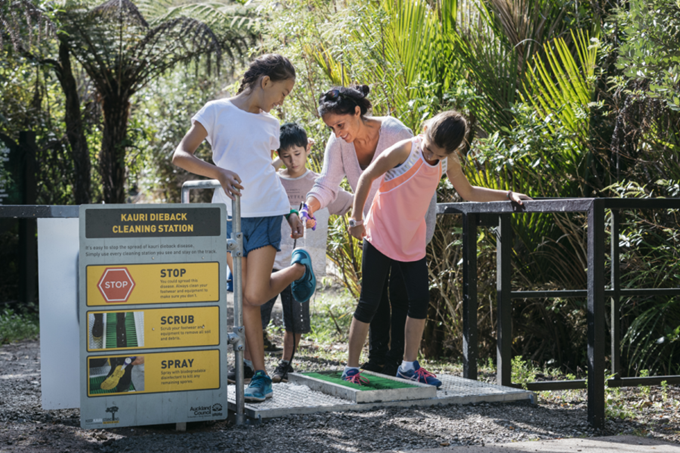Labour Weekend means more Aucklanders emerging from winter hibernation to enjoy the beautiful parks and open spaces that the region has to offer.
Councillor Alf Filipaina, Deputy Chair of the Environment and Community Committee, encourages people to explore the region but to keep kauri protection top of mind this weekend, as we head into the summer season.
“Kauri dieback disease is a serious issue for the Auckland region and it’s vitally important that each one of us takes steps to protect this precious taonga.
“Auckland Council has been working hard on protection measures and our programme has expanded since the introduction of the natural environment targeted rate introduced in June; but we need your help.
“To keep our kauri standing, we all need to do our part. It’s not difficult, but it will make a difference.
“Please always respect closures in place. They are there for a reason and if you choose to break the rules, you are putting the future of kauri at risk.
“We understand the frustration for many people at not being able to walk their favourite track, but we’re lucky in Auckland that there are plenty of other places to visit.”
What is kauri dieback disease?
Kauri dieback disease spreads through spores in soil. The disease infects the tree through its roots and damages the tissues that carry nutrients within the tree. Almost all infected kauri die.
While scientists are working hard to find control tools for the disease, there is currently no known cure.
This means that right now, the best thing we can all do is to ensure that we don’t carry any soil into, or out of, areas with kauri.
What do I need to do when visiting areas with kauri?
Auckland Council has closed a number of high-risk kauri tracks and areas across Auckland. Find out tracks and areas that are closed here.
However, if you do visit an open kauri area, here are some simple steps to follow:
Firstly, check your footwear and gear before you leave home to ensure they are soil-free.
Always Scrub, Spray, Stay!
- Scrub your shoes and equipment (including bike tyres, pram wheels) to remove all soil
- Spray the soles of your shoes and equipment with Sterigene disinfectant.
- Stay on open tracks (and away from kauri tree roots).
Even if your footwear and gear look soil-free, set a good example for yourself and others and always use the cleaning stations.
Please let Auckland Council know if you come across any cleaning stations that need refills.
What work has Auckland Council been doing to protect kauri?
- In May, the council closed the forested areas of the Waitākere Ranges Regional Park and several high-risk tracks in the Hunua Ranges Regional Park. More recently, we have proactively closed a number of tracks in parks in the Kaipatiki area, and an area of the Clevedon Scenic Reserve.
- Controlled Area Notices (CANs) from the Ministry for Primary Industries are in place across the areas that remain open in the Waitākere and Hunua Ranges Regional Parks. They are a mechanism of the Biosecurity Act and mean you must not carry any visible soil on your footwear and equipment into these areas and must use all cleaning stations that you encounter. Compliance officers monitor the CANs and do have enforcement powers.
- Track upgrades are ongoing, and our teams and volunteers have been out working hard to bring the surfaces of additional tracks up to the required standard
- Cleaning stations are in place in kauri areas across the region, including new stations at many locations. One example is at Duder Regional Park which now has a dual entry station with grate and brush system and spray bottles, and park visitors must enter the park via this station.
- Compliance Officers will be in place at various locations throughout the Waitākere and Hunua Ranges during Labour Weekend checking that people are cleaning their shoes, monitoring closed areas and raising awareness of the disease, and hygiene requirements.
- Kauri dieback track ambassadors will also be out during summer, raising awareness of the disease, and what to do to stop the spread.


